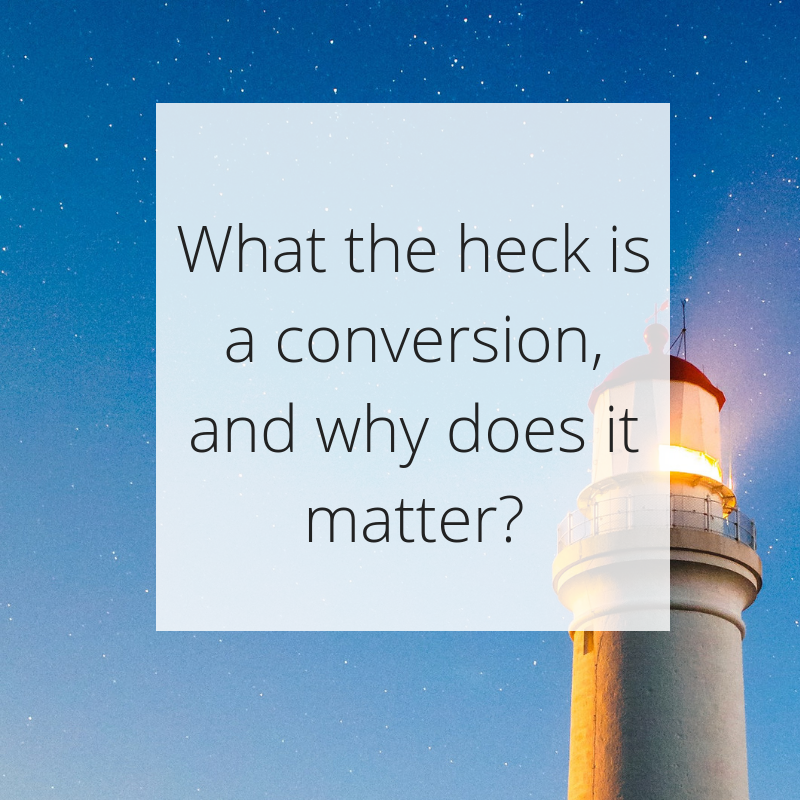
Small business owners are some of the busiest people on the planet. Fulfilling orders, buying supplies, doing payroll—the to-dos and responsibilities can be overwhelming.
It’s this feeling of overwhelm that often prevents small business owners from really understanding their marketing.
That’s why it’s crucial to create a sales funnel for your small business. Iit all starts with something called a conversion.
What is a conversion?
In the world of marketing, a conversion means that a customer took a desired action based on your marketing.
For example, if you’re running a Pinterest campaign to promote your latest jewelry line, you receive a conversion each time someone buys as a result of the Pinterest campaign.
We often look at conversions from a sales and numbers perspective, but a conversion can be anything. If you’re running a campaign to build your email subscribers, you get a conversion each time someone subscribes to your list.
A conversion could also be visitors downloading a freebie in exchange for their email address.
At its core, conversions are just customers doing the things you want them to do.
The key to conversions is that they’re highly measurable. They’re a crucial piece of data that can save you time and money.

Why do conversions matter?
Conversions aren’t just for professional marketers. In fact, small business owners should focus their online branding efforts on conversions.
1. Know what works – and what doesn’t
Let’s say you’re running a Pinterest ad to promote your latest line of crocheted hats. You’re throwing $50 a day at this campaign, only to see few customers coming over to your site to make a purchase.
On the flipside, you have an ongoing Pinterest campaign for your turquoise jewelry line that brings in customers like crazy with little management.
What gives?
Conversions are a blessing to small businesses. They show the cold, hard truth of what efforts work, and which ones don’t.
In the above example, maybe it’s out of season and people don’t want to buy crocheted hats. Maybe a famous starlet was seen wearing turquoise jewelry and it’s the new “in” accessory.
The lack of conversions on the crocheted hats would indicate that something is awry, either with the campaign itself or the overall strategy. It’s up to you to do the detective work, but knowing the problem is the first step.
Conversions will also show where you should be pumping more of your time and money.
If your turquoise jewelry campaign is doing very well for little money, it’s time to take a closer look at what makes that campaign tick. As it turns out, you may have less competition in this space, leading to cheaper advertising costs.
Since it’s a niche space, you also find customers when they’re ready to buy, since you used more targeted keywords while planning the campaign.
Conversions are a powerful tool that shows exactly how your marketing efforts affect your bottom line.
Don’t try to force something to work when the data is telling you otherwise. Take the path of least resistance to give customers what they want.
2. Be your own critic
It’s hard to know that you’re always doing the right thing. Businesses don’t come with manuals, especially if you’re a one-person operation.
It’s tempting for small business owners to look to friends and family for feedback on their marketing. This seems like a great idea, but it won’t get you the actionable, quality feedback you crave.
Family and friends know how much dedication it takes to run your business. They don’t want to hurt your feelings. That’s why they usually will say you’re doing a great job, and shy away from mentioning areas that need actual improvement.
Fortunately, there’s a much easier way to be your own critic, with nearly zero bias.
Check out your analytics, whether they’re on Pinterest, Twitter, MailChimp, Google Analytics, Facebook, ConvertKit, etc.
These sources are rich with conversion data that, when listened to, can help you improve business by leaps and bounds.
For example, let’s say Dan manages an online candle shop. He checks out his Google Analytics data and realizes that 80% of the people coming to his site are interested in soy candles.
But guess what? Dan doesn’t make soy candles!
Visitors come to his site and don’t convert because they aren’t finding what they want. This could lead Dan to either make soy candles, or adjust his marketing to manage customer expectations.
No matter what course of action he wants to take, Dan has more information to improve his business.
Conversions allow you to be your own mentor, instructor, and critic. Use them to pinpoint where you can improve, as well as to celebrate what you do well.

3. Spend money more wisely
Cash flow is a precious, precious resource for small businesses. Mom-and-pop shops can’t throw money at a problem; they have to be inventive to preserve their hard-earned cash.
Luckily, conversion tracking is a cost-effective tool for small business owners.
First of all, it’s almost always free to track your conversions. They’re a natural part of whatever analytics platform you use, so you’re likely already tracking conversions!
Conversions help small businesses guard more of their money by showing you where the money is best spent.
In the previous crocheted hat example, the seller would have been wise to stop pumping money into her crochet hat Pinterest campaign and more into the turquoise jewelry campaign.
If something isn’t converting, there’s a good chance that it’s a waste of your money.
Track what marketing efforts make an impact on your bottom line to know where to prioritize your dollars.
Don’t worry: you can always resuscitate a marketing campaign by adjusting your messaging, photos, and audience targeting.
The bottom line
Conversions are an excellent tool to measure when your marketing efforts actually lead to a sale.
We know small business owners are strapped for time and marketing funds. Why not maximize both by checking out your conversions?
You don’t have to be a marketing master to measure your conversions. In fact, see check out this step-by-step guide with instructions for setting up conversion tracking in Google Analytics.
